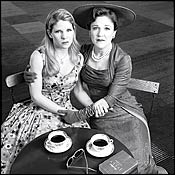
It is hard to say whether The Light in the Piazza is a tentative but significant step forward for the endangered American musical or a noble failure. Either way, it is head and shoulders above its cohort (Dessa Rose, Spamalot, and that lot), which, admittedly, isn’t saying all that much. What can be said with total assurance is that anyone who cares about the rather uncertain future of this truly American genre should—must—see the show, think and worry about it, and reach his or her own conclusions.
For starters, Lincoln Center Theater’s production is breathtaking. Not since Ralph Funicello’s scenery for this same theater’s Henry IV has there been décor like Michael Yeargan’s for Piazza. You do not merely (merely?) feel transported to Florence and Rome; you are initiated into the mysterious essence of those fabled cities. And thanks to Christopher Akerlind’s lighting, you also ingest a sense of timelessness within passing time—of the fateful resonance of a momentous moment. You lose the feeling of stage and scenery; you are actually, acutely there: in that music, those words, that happening.
I have not read Elizabeth Spencer’s novel on which the show is based, and have, except for Yvette Mimieux and Rossano Brazzi, rather forgotten the movie. But here is the story. An American mother, Margaret, in youthful middle age, and her young, and younger acting, daughter, 26-year-old Clara, are on a visit to Italy in 1953, where Margaret and her husband, Roy, honeymooned once, a spent love ago. Pretty Clara, owing to a kick in the head by a pony when she was 10, has become mentally beclouded: Her behavior lags behind her woman’s body. But it’s something that does not obviously show, or prevent handsome, 20-year-old Fabrizio, son of Signor Naccarelli, a Florentine haberdasher, from falling in love with her on first piazza sight.
The Naccarelli family—which also comprises the compassionate Signora, the philandering elder son, Giuseppe, and Franca, his barren and resentful but loving wife—takes to Clara. But Margaret, foreseeing the consequences to both Clara and the Naccarellis if marriage should ensue, tries, without quite being able to enlighten them why, to prevent a wedding. So, too, if only by telephone, does Roy. It is almost a case of Montagues and Capulets—and that’s as much as I can tell you here.
Craig Lucas’s book seems perfectly adequate to me, but the emphasis must be on Adam Guettel’s music and lyrics. Those lyrics, I’m afraid, are a bit self-consciously poeticizing, a trifle arcanely oblique. But the music, though fluctuating between the Sondheimesque and offbeat but still Broadwayish and the art-songlike and even operatic, is steadily absorbing, even if only intermittently melodious. One duet, “Let’s Walk,” is an unqualified hit, but the rest, without fully cohering, is also arresting. It is—to offer a classical parallel—as if a world weaned on Brahms were suddenly confronted with Schoenberg. Ted Sperling and Guettel’s jaunty orchestrations add to the slightly disorienting but wholly fascinating harmonies and instrumentation. Bartlett Sher’s direction, making imaginative and compelling use of stage space, creates cinematically panoramic fluidity.
The entire cast acts, sings, coexists with uniform ensemble efficiency. Kelli O’Hara may lack Clara’s ambiguous charisma and drop-dead looks, but she sings well and comports herself convincingly. Victoria Clark’s Margaret is, quite simply, superb; if not exactly Rossano Brazzi, Mark Harelik is a resourceful and fascinating Signor Naccarelli. Matthew Morrison is a fine-looking and ingenuous Fabrizio, Michael Berresse a suitably caddish yet likable Giuseppe, Sarah Uriarte Berry a perky and touching Franca, Patti Cohenour an understatedly winning Signora, and Beau Gravitte a sympathetically unsympathetic Roy. The use of much unsurtitled Italian, and even a goodly bit of ecclesiastic Latin, may be a mite excessive, but it, too, is original and daring, like everything else that lights up this Light in the Piazza.
The Light in the Piazza
Music and lyrics by
Adam Guettel.
Book by Craig Lucas.
Vivian Beaumont Theater. Through June 12.